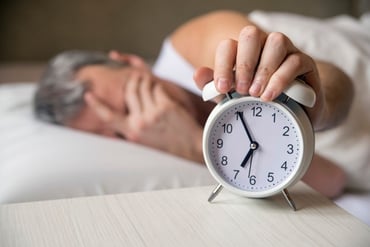Spring is almost here! That means it’s time to “spring forward.” Daylight Saving Time begins on Sunday, March 11th at 2 a.m. While it’s exciting to think about longer days and warmer weather, Daylight Saving Time can sometimes be a difficult transition for many full-time employees.
The loss of an hour can take its toll. In fact, the week after Daylight Saving Time has an increased rate of car accidents – which are often blamed on sleep deprived or drowsy drivers. A study by the University of Colorado at Boulder found an increase in fatal motor vehicle accidents the first six days after the clocks spring ahead. The study reported that in the first six days of Daylight Saving Time there were 302 deaths and a cost of $2.75 billion over a 10-year period.

Springing forward is much more difficult for your body than “falling back” is in November. Getting sleepy before bedtime becomes more difficult due to the changes in the amount of daylight, which can throw off your circadian rhythm (your body’s internal clock). When sleep cycles are disrupted, it can take about a week to start getting back on track. Losing even just an hour of sleep can cause drowsiness throughout the day that can lead to accidents or difficulty concentrating at work.
The good news is you can help combat drowsy morning commutes and an unproductive week at the office with some preparation and better sleeping habits. Check out some foolproof tips below that will help full-time employees adjust to Daylight Saving Time with ease.
Ease into an earlier bedtime. Kim West, LCSW-C, otherwise known as The Sleep Lady, suggests adapting to this sleep schedule prior to Daylight Saving Time:
- Go to bed 15 minutes earlier than usual on the Thursday (March 8th) before Daylight Saving Time begins
- On Friday, go to bed 30 minutes earlier than usual
- On Saturday, try to go to bed 45 minutes earlier than your usual bedtime
Easing into an earlier bedtime can help train your body to compensate for one less hour of sleep on Sunday. After that, you can transition yourself back to your usual bedtime. Bonus tip: going to bed and waking up around the same time every day is one of the best things you can do to improve your sleeping habits!
Watch what you drink. If possible, avoid alcohol the weekend of Daylight Saving Time. While alcohol might make it easier for you to fall asleep, it disrupts your sleep cycle and overall quality of sleep. Since you will already be dealing with a major sleep disruption this weekend, it might be best to avoid combining that with alcohol. You should also try to avoid drinking any caffeinated beverages for at least four to six hours before bedtime. That afternoon coffee will make it much more difficult to get to bed earlier!!
Create a good sleeping environment. Sleep isn’t just about quantity; it’s about quality, too. To ensure that you get quality sleep this weekend, you might need to adjust your bedroom to promote a good night’s sleep. Keep your room temperature set to around 65 degrees, and block out any disruptive noise or lights. Check out this blog post for more details on creating the perfect sleeping environment.
Exercise. Staying active during the day will help you get to bed earlier and enjoy more quality sleep. Just remember not to exercise late in the evening for before it’s time to wind down for bed – as exercise can give you a jolt of energy. Engage in some psychical activity on Saturday morning or afternoon to help set you up for a night of great sleep.
Avoid bright screens. Stay away from late night TV, laptop use, and cell phone use for about one to two hours prior to your bedtime. Exposure to the blue light emitted from these digital screens is distributive to sleep and messes with your circadian rhythm – making it difficult to fall asleep.
Get some sun. Expose yourself to some bright, natural sunlight as soon as you wake up on Sunday morning. The bright light exposure will help get your circadian rhythm back on track – helping you wake up and feel more energized instantly. Try eating breakfast in a bright area of your house or taking your dog for a quick walk around the neighborhood.
Daylight Saving Time doesn’t have to disrupt your workweek or leave you feeling groggy at the office. With a bit of preparation, springing forward won’t keep you from feeling and performing your best. Be sure to try out some of the above tips and focus on getting some quality sleep this weekend!
Do you feel more tired than usual after Daylight Saving Time? What tips help you beat the fatigue? Feel free to share in the comment section below!
Like this blog post? Share it with your employees or co-workers with this printable version of the blog!
Image created by Dragana_Gordic - Freepik.com



